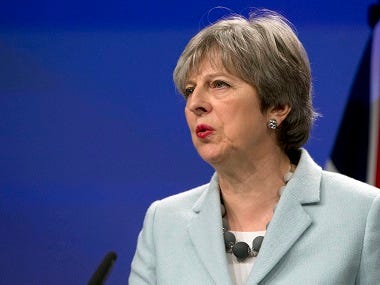Brexit: Indian businesses must face facts to survive shift in UK policies, take timeout from Commonwealth fantasy league

File image of British prime minister Theresa May. AP
In the 29 months since the UK narrowly voted to leave the European Union, there has been an element of fantasy football to India’s planning for Brexit. To be fair, this has been the case with the British team too. Just as in a fantasy game, both sides have been playing to win on the basis of notional strengths. In the usual online fantasy game, players assemble imaginary teams made up of ace, real-world sportsmen. For Brexit, winning is premised on a hypothetical set of circumstances that align mathematically — even magically — just like heavenly bodies in harmony.
For Britain, the hypotheticals include a fast-tracked, broad and deep trade deal with India as well as a dream-team partnership that enables both countries to relentlessly work a pan-Commonwealth free trade agreement. For India, post-Brexit hypotheticals cover a range of highly desirable scenarios: more employment opportunities in Britain for skilled Indian workers; more Indian rather than European students in the UK, many of them on scholarships generously funded by the British government; tax breaks for Indian companies prepared to invest in the UK, and, finally, a free trade agreement with Britain that potentially benefits key sectors such as textiles, machinery, engineering goods, information technology and banking.

File image of British prime minister Theresa May. AP
There is some basic logic to the magical thinking on both sides. If Britain really does exit the EU (and this is by no means certain, even now), it will look to the Commonwealth as a sort of post-Brexit lifeboat. The 53-member multilateral organisation that started life as a club of former British colonies, mostly has a shared language and some law and regulatory commonality. More to the point, it has 2.4 billion people, a third of the planet’s population. In its search for lucrative trade deals and influence to replace the losses inflicted by Brexit, the UK wants to boost the Commonwealth for its own benefit. To do this jointly with a rising power such as India — one of the Commonwealth’s largest economies and with roughly half its population — would make sense.
India, as an Indian diplomat formerly assigned to the UK, told me, does see post-Brexit “joint opportunities (with Britain) in Commonwealth countries”. And analysts with Binder Dijker Otte, an international network of public accounting, tax, consulting and business advisory firms, point to the way Britain and India could work the Commonwealth in concert and to mutual benefit.
At the Commonwealth Heads of Government Meeting in London in April last year, Prime Minister Theresa May announced UK government funding for a new Commonwealth Standards Network. The network would establish a common language for goods and services to help boost trade, which Indian companies would energetically corner, divvying up some of the opportunities with their British counterparts.
That would work spectacularly well for post-Brexit Britain as well as for Indian businesses, which could reach parts, particularly in Asia, in ways the non-Commonwealth Chinese cannot. It would mean that the Indian business presence in the UK would continue to grow at least in the way it has for years — roughly 10 percent — or even more strongly.
Right now, there are 800 Indian companies in Britain, which employ more than hundred-thousand people. But, here’s where the fantasy sports aspect of a supposedly win-win situation kicks in. Though the prospect of a Commonwealth free trade agreement has elicited interest within the organisation, creating it will be complex and time-consuming. It will require agreement from each member-state, each with its own agenda and non-negotiables. A British-supported Common Standards Network for Indian business to utilise would also be testing and probably take years.
More British jobs for Indians and the chance for Indian students to work in the UK after graduation also run into a solid, all too real barrier. In theory, post-Brexit Britain will need to turn to India and elsewhere to replace the European doctors, nurses, midwives, veterinarians, and other workers who have either left, are leaving, or no longer actively considering a job in the UK.
On 19 November, May said, “Software developers from Delhi” would no longer lose out to EU nationals when it comes to British jobs. Perhaps. But with the vote for Brexit at least partially cast on the issue of keeping foreigners out of the country, how realistic is it to expect Brexit Britain to enthusiastically solicit visually distinct, South Asian workers? Brexit supporters were opposed to white, Christian, European foreign workers. They are hardly likely to welcome — let alone support government endorsement of — brown, mostly non-Christian Indians.
In the short term, Brexit raises two red flags for Indian business: political uncertainty and oscillating business policy along with fluctuating market share and prospects. And restructuring to set up EU subsidiaries, possibly in English-speaking Ireland, but even perhaps in the Netherlands, Belgium, France or Germany depending on the sector and business targets.
In any case, everything — including new British trade deals with India and the wider Commonwealth — was newly thrown into doubt and confusion after 14 November. That was the day Prime Minister May announced a contested draft agreement with the EU, one that would keep the UK in the European customs union. Obviously, that would rule out independent trade deals for the time being with India and other countries on goods, though not necessarily on the services sector.
In that situation, Indian business just as much as Britain would probably have to call timeout on the fantasy game.

